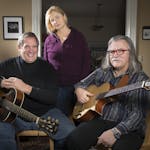"I remember it was the most perfect May day in Minneapolis. It was breezy, the patios were open, everybody was walking up Nicollet Mall. And I was like, 'Minnesota's gonna be a sweet spot.' "
Tesfa Wondemagegnehu is a Southern boy at heart — he hails from Memphis. But he smiled broadly as he recalled the day six years ago when he came to Minneapolis to audition for a job at Twin Cities choir VocalEssence.
A lot of water has flowed under the bridge since then. Wondemagegnehu's reputation has burgeoned as an inspirational conductor and clinician, nationally as well as locally. His latest project is "Resistance and Resilience," a program he devised for the One Voice Mixed Chorus, an LGBTQ community choir in the Twin Cities that he has been guest-conducting.
"Resistance and Resilience," being sung Saturday and Sunday at the Ordway in St. Paul, is no ordinary choral concert. It boldly, perhaps controversially, links together two movements Wondemagegnehu feels passionately about — the struggle for African-American civil liberties, and the gay rights movement.
Half of the concert is devoted to a new work titled "Quiet No More," co-written by six composers. Commissioned by the New York City Gay Men's Chorus and the Gay Men's Chorus of Los Angeles, it commemorates the 50th anniversary of the Stonewall Uprising, when a police raid on a gay bar in New York City sparked rioting and fueled the rise of the gay rights movement.
Wondemagegnehu sees no incongruity linking the Stonewall riots with the historic struggle of the African-American people. In fact, he finds the parallels all too real and discomforting.
There are places in the eight movements of "Quiet No More" in which the violent confrontations of police and gay people at the Stonewall Inn are depicted, he explains.
"And then I think about all these black bodies across the country being brutally murdered at the hands of police officers," he said. "We have to see the intersection between that and Stonewall, and start intelligently questioning the policing in our communities."
Music is one way of doing that, he argues. The first half of the "Resistance and Resilience" program features music from the African-American tradition, focusing particularly on black spirituals.
"Spirituals are one of our original resistant musical art forms," he said. "Slaves sang them to communicate sorrow, but also hope and joy about the possibility of freedom.
"The gay community has also been fighting oppression for so long, and there's an intersection there. I don't know if we've ever really had a concert which tries to unpack that intersection."
He is aware that there are dangers involved in identifying overlaps between these historical experiences. Is it really possible, for instance, to compare the appalling subjugations and legacy of slavery with the modern-day plight of other oppressed groups in American society? Is that even appropriate?
Wondemagegnehu's response is clear, and disarming. "The black and LGBTQ communities have faced similar atrocities," he says. "We musn't try to out-woke each other, because that's divisive. We have to figure out a way to work together, to repair the pain that's been caused."
As an African-American, his empathy with their struggle for civil rights is so deep as to be virtually genetic. His understanding of the gay rights movement has been more gradual, he says, and at times fraught with difficulty.
"I grew up in a black Baptist church down in Memphis," he noted. "I am so grateful for that Baptist upbringing, but I have to own the homophobia I grew up embracing. It came from my community in south Memphis, and from my religious upbringing. For a long time, right into my college years, it was a problem."
Music, and the people Wondemagegnehu met through it, gradually changed his attitude.
His first Twin Cities post, as VocalEssence assistant artistic director, led to work at American Public Media and Westminster Presbyterian Church. Appearances at the Aspen Music Festival and Carnegie Hall, and a prestigious residency at the Harvard University Glee Club, burnished his stature nationally.
This past year he has been working as a visiting instructor at St. Olaf College, where he conducts the Viking Chorus and Chapel Choir, and teaches a music and social justice course.
Nowadays he is evangelical about the unexpected bonds that can be forged between disparate groups of people, in the healing environment of musical happenings.
He hopes the One Voice concert will be a contribution to that boundary-breaking process. "Uniting the fight" is how he describes it, referring to the "emotional capital" that people gain by singing together.
"You know, in 1969 gay people stood up to police officers at Stonewall and said, 'Enough is enough, get your damn hands off of me, we're done.' I look at that power, and I think we're on the precipice of something similar happening in 2019 and later.
"These communities — both gay and African-American — that have been oppressed and marginalized for so many years are going to wake up, combine forces, and say 'Game over.' And I'm looking forward to that day."
Terry Blain is a freelance classical music critic for the Star Tribune. Reach him at artsblain@gmail.com.




![John Mayer performed Saturday night. ] AARON LAVINSKY • aaron.lavinsky@startribune.com John Mayer performed Saturday, April 15, 2017 at Xcel En](https://arc.stimg.co/startribunemedia/JV2GTHXCN3AZZ34DQLTEJ67DN4.jpg?w=75&h=75&fit=crop&crop=faces)
